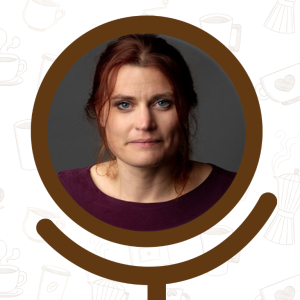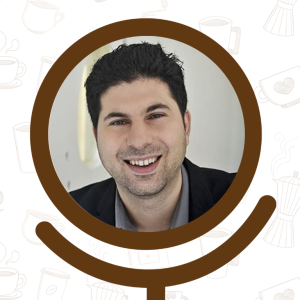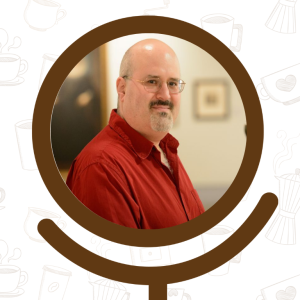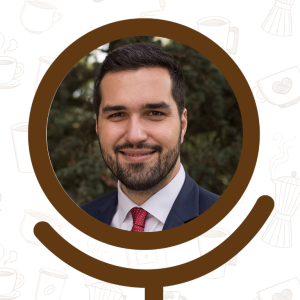Fueling Creativity in Education
Episodes

Tuesday Feb 01, 2022
Tuesday Feb 01, 2022
How can teachers prepare students for the innovative future of work? In this episode of Fueling Creativity, Dr. Cyndi Burnett and Dr. Matthew Worwood speak with world-renowned author and Professor of Engineering Innovation, Dr. David Cropley, about the psychology and ethics of creativity and innovation in the context of technology, engineering, and design. Listen in to learn how educators can prepare students to be better equipped to work with machine learning and AI in creative and problem-solving environments.
“The big issue with creativity right now revolves around the future of work and the growing role of AI, so artificial intelligence and automation and related technologies, that are impacting the work place.” - Dr. David Cropley
David explains the difference between domain general and domain specific creativity, why it’s more challenging to feel creative as a teacher in the sciences or humanities, and the unique role of malevolent creativity in education and business. He also speaks on how rigorous, objective creativity testing can be made accessible to schools. Plus, David shares his thoughts on the relationship between and prioritization of aesthetics, novelty, and functionality in any design process.
David’s Tips for Teachers:
Creativity is a multifaceted competency. Don’t think about creativity as a 21st century skill, it’s better to think about it as a general competency or capability.
Creativity is about how we think and personal qualities, like openness to new experiences, willingness to take risks, tolerance for uncertainty, etc. It’s also a matter of the environment. You have the opportunity to demonstrate aspects of creativity in the classroom.
Try and be very concrete about making creativity happen. Shift towards asking more open-ended questions and prompting students to solve open-ended problems.
Resources Mentioned:
Books by Dr. David Cropley
Eager to bring more creativity into your home or classroom?
Access various creativity resources and tools & listen to more episodes of The Fueling Creativity in Education Podcast by visiting www.CreativityandEducation.com.
What to learn more about Design Thinking in Education?
Do you want to build a sustained culture of innovation and creativity at your school? Visit WorwoodClassroom.com to learn how Design Thinking can promote teacher creativity and support professional growth in the classroom.
Subscribe to our monthly newsletter!
You can also find The Fueling Creativity Podcast on Apple Podcasts, Spotify, Audible, and PodBean! Make sure to rate, review, and share the podcast if you enjoy it!
About Dr. David Cropley:
David Cropley is the Professor of Engineering Innovation at the University of South Australia. He specialises in helping people and organisations become better, more effective, problem solvers.
Dr Cropley joined the School of Engineering at the South Australian Institute of Technology (SAIT) in 1990, after serving for four years in the United Kingdom’s Royal Navy, including deployments to the Caribbean and Middle East. Following the establishment of the University in 1991, he completed a PhD in Measurement Systems Engineering in 1997, and a Graduate Certificate in Higher Education in 2002.
Dr Cropley is author/co-author of nine books including Creativity and Crime: A Psychological Analysis (Cambridge University Press, 2013); The Psychology of Innovation in Organizations (Cambridge University Press, 2015), and Femina Problematis Solvendis – Problem-Solving Woman: A History of the Creativity of Women (Springer, 2020).
Books by Dr. David Cropley
Connect with him on LinkedIn
Follow him on Twitter

Friday Dec 17, 2021
Discussing Excellence Gaps and Creativity with Dr. Jonathan Plucker - Part 2
Friday Dec 17, 2021
Friday Dec 17, 2021
It’s easy to have a negative view of testing, but testing does have value in terms of content knowledge acquisition. In part two of this two-part interview, Dr. Cyndi Burnett and Dr. Matthew Worwood speak with researcher and creativity expert, Dr. Jonathan Plucker, about the relationship between gifted education and creativity. Jonathan also speaks on why he believes every school should have a Chief Creativity Officer and what that would look like.
Tune in to learn Jonathan’s approach to testing students, assessing for gifted education programs, and how to identify students who are talented or gifted. He sheds light on why it’s a huge mistake to drive advanced learning and creativity out of our schools. Plus, he shares his thoughts on why educators should be focusing on students with true potential who are underperforming and turning that potential into advanced performance.
“If a student’s performing at advanced levels, I encourage people not to overthink that. Just accept it. Great, they’re working at advanced levels. That’s the goal. How much further can I push this student?... But we have so many students who are not performing at those advanced levels who have the potential to get there and that’s what I’m really concerned about is we tend to look right past those students.” - Dr. Jonathan Plucker
Jonathan’s Tips for Teachers, Administrators, and Parents:
The best way to use teacher involvement is to focus on what they are trained to do: to help students, especially those who aren’t being noticed. If you’re going to be identifying for a talent, don’t use teachers as gatekeepers. Collect all your data and then use teachers as the safety net to catch those whom the administrators missed.
Modeling is incredibly important for creativity. If you run into a problem, have your students/children work with you to solve it.
Creative Articulation: Professional, long-term creators are very good at convincing people that their work is creative. They are also masterful at incorporating feedback and using it to improve their work. Help your students/children learn how to share their creativity and persuade others that their perspective is valuable… at ALL ages.
About Dr. Jonathan Plucker:
Jonathan Plucker is a prominent education policy and talent development scholar, and the inaugural Julian C. Stanley Professor of Talent Development at Johns Hopkins University. He holds a joint appointment at the Center for Talented Youth and School of Education.
His work focuses on education policy and talent development and has been supported by over $40 million in external grants and contracts. Jonathan has published over 300 articles, chapters, and reports. He recently became editor for the Psychological Perspectives on Contemporary Educational Issues series at IAP. His work defining and studying excellence gaps (http://cepa.uconn.edu/mindthegap) is part of a larger effort to reorient policymakers’ and educators’ thinking about how best to promote success and high achievement for all children.
Visit Jonathan’s website
Follow him on Twitter
Book & Publications by Dr. Jonathan Plucker
Resources Mentioned:
Book & Publications by Dr. Jonathan PluckerListen to the episode with Scott Barry Kaufman
Listen to the episode with Sally Reis
Eager to bring more creativity into your home or classroom?
Access various creativity resources and tools & listen to more episodes of The Fueling Creativity in Education Podcast by visiting www.CreativityandEducation.com.
What to learn more about Design Thinking in Education?
Do you want to build a sustained culture of innovation and creativity at your school? Visit WorwoodClassroom.com to learn how Design Thinking can promote teacher creativity and support professional growth in the classroom.
Subscribe to our monthly newsletter!
You can also find The Fueling Creativity Podcast on Apple Podcasts, Spotify, Audible, and PodBean! Make sure to rate, review, and share the podcast if you enjoy it!

Friday Dec 17, 2021
Discussing Excellence Gaps and Creativity with Dr. Jonathan Plucker - Part 1
Friday Dec 17, 2021
Friday Dec 17, 2021
Our last guest of the season features a double expresso with President of the National Association for Gifted and Talented, Dr. Jonathan Plucker. In part one of this two-part interview, Jonathan shares his thoughts on problems with achievement gaps and excellence gaps in education.
“I’m actually fully convinced that in the next 10-15 years, if we prioritize this, we can actually go a long way to solving this problem… and I could not have said that five or six years ago.”
- Dr. Jonathan Plucker
Listen in to gain insight into the connection between academic excellence and creativity later in life, and why there’s never a blank canvas to work with when being creative. Jonathan also shares his candid thoughts on creativity in imaginative play, as well as how we can diminish the harmful impact of poverty on children’s ability to develop imagination.
“The more that students learn, the more information, the more ‘stuff’… that they have at their mental fingertips, the better off they will be as they try to be creative, especially as they move into their careers later in life.”
- Dr. Jonathan Plucker
About Dr. Jonathan Plucker:
Jonathan Plucker is a prominent education policy and talent development scholar, and the inaugural Julian C. Stanley Professor of Talent Development at Johns Hopkins University. He holds a joint appointment at the Center for Talented Youth and School of Education.
His work focuses on education policy and talent development and has been supported by over $40 million in external grants and contracts. Jonathan has published over 300 articles, chapters, and reports. He recently became editor for the Psychological Perspectives on Contemporary Educational Issues series at IAP. His work defining and studying excellence gaps (http://cepa.uconn.edu/mindthegap) is part of a larger effort to reorient policymakers’ and educators’ thinking about how best to promote success and high achievement for all children.
Visit Jonathan’s website
Follow him on Twitter
Book & Publications by Dr. Jonathan Plucker
Resources Mentioned:
Book & Publications by Dr. Jonathan PluckerListen to the episode with Scott Barry Kaufman
Listen to the episode with Sally Reis
Eager to bring more creativity into your home or classroom?
Access various creativity resources and tools & listen to more episodes of The Fueling Creativity in Education Podcast by visiting www.CreativityandEducation.com.
What to learn more about Design Thinking in Education?
Do you want to build a sustained culture of innovation and creativity at your school? Visit WorwoodClassroom.com to learn how Design Thinking can promote teacher creativity and support professional growth in the classroom.
Subscribe to our monthly newsletter!
Follow Cyndi and Matt on Linkedin.
You can also find The Fueling Creativity Podcast on Apple Podcasts, Spotify, Audible, and PodBean! Make sure to rate, review, and share the podcast if you enjoy it!

Friday Nov 12, 2021
The role of Serendipity in Creativity with Dr. Wendy Ross
Friday Nov 12, 2021
Friday Nov 12, 2021
How does serendipity affect creativity? In this episode of the Fueling Creativity podcast, Dr. Cyndi Burnett and Dr. Matthew Worwood speak with Dr. Wendy Ross, a cognitive scientist, senior lecturer in psychology, and Chair of the Serendipity Society. Wendy’s research looks at the role of serendipity in creativity, using everything from experimental methods to ethnographic work.
Listen in as Wendy shares her research findings on the relationship between serendipity and creativity, why serendipity is a disruptive force in learning, and the importance of students building a tolerance to failure and adversity. She also gives powerful advice for educators on implementing this knowledge around serendipity in the classroom.
They also discuss the current debates on whether the pandemic has increased or decreased feelings of serendipity, as well as what teachers can do foster a norm of working through discomfort and mistakes.
“That’s what makes serendipity a powerful tool, is that it relies on the prepared mind and it relies on this idea of scarcity of wisdom, of using the accidents that come to you and taking advantage of them.” - Dr. Wendy Ross
Wendy’s Tips for Teachers:
Encourage your students to get comfortable with discomfort and failure.
Generate interesting environments with many different moments of inspiration and pathways of creativity.
Most serendipity comes from interactions with people, not with things.
Resources Mentioned:
Listen to the episode with Vlad Glaveanu.
Listen to the episode with Ron Beghetto.
Eager to bring more creativity into your home or classroom?
Access various creativity resources and tools & listen to more episodes of The Fueling Creativity in Education Podcast by visiting www.CreativityandEducation.com.
What to learn more about Design Thinking in Education?
Do you want to build a sustained culture of innovation and creativity at your school? Visit WorwoodClassroom.com to learn how Design Thinking can promote teacher creativity and support professional growth in the classroom.
Subscribe to our monthly newsletter!
About Dr. Wendy Ross:
Wendy’s main topic of research is the role of material serendipity in higher cognitive processes such as insight problem solving and creativity. She draws on a range of methods from eye-tracking and experimental psychology to focused cognitive ethnography. She is currently co-editing two collections on serendipity: The Art of Serendipity (Palgrave) and Serendipity Science (Springer). She is Co-Chair of the Serendipity Society and Vice President of the Possibility Studies Network. In 2021, she was awarded the Frank Barron prize by Division 10 of the APA.
Connect with Wendy:
Connect with her on LinkedIn: www.linkedin.com/in/wendy-ross-670487191
You can also find The Fueling Creativity Podcast on Apple Podcasts, Spotify, Audible, and PodBean! Make sure to rate, review, and share the podcast if you enjoy it!

Friday Oct 01, 2021
Dr. Scott Barry Kaufman and the New Science of Self-Actualization
Friday Oct 01, 2021
Friday Oct 01, 2021
In this episode of the Fueling Creativity podcast, Dr. Cyndi Burnett and Dr. Matthew Worwood interview cognitive scientist and humanistic psychologist, Dr. Scott Barry Kaufman, about his most recent book, Transcend: The New Science of Self-Actualization. In this book, he reimagines Maslow’s Hierarchy of Needs. Dr. Kaufman shares his discoveries from diving deep into the psychological theories of Abraham Maslow, highlighting powerful thoughts on how educators can establish a safe environment with students and how feelings of uncertainty and insecurity play a major role in a child’s ability to learn.
Dr. Kaufman also speaks on why exploration is a key driver of creativity as well as how to encourage students to be open to new experiences, be aware of their judgments and biases, and find meaning in life.
You’ll hear a fascinating analogy of how life is like a sailboat and how microconnections can help you establish meaningful relationships with your students and colleagues.
Plus, Dr. Kaufman sheds light on how twice-exceptional students develop different skillsets, along with what educators can do to maximize their potential in the classroom.
Dr. Kaufman’s Tips for Teachers:
Be open to new ports that you might be wanting to sail to throughout your semester.
Encourage respectful dissent in your classroom.
Model openness for your students.
Resources Mentioned:
Love 2.0 by Barbara Frederickson: www.positivityresonance.com
The Bias That Divides Us by Keith Stanovich: www.keithstanovich.com/Site/Books.html
About Dr. Scott Barry Kaufman:
Dr. Scott Barry Kaufman is a cognitive scientist and humanistic psychologist. He is the founder and director of the Center for the Science of Human Potential, and the author of several books, including Ungifted: Intelligence Redefined, Wired to Create, and most recently, Transcend: The New Science of Self-Actualization. Scott hosts the #1 psychology podcast in the world - The Psychology Podcast. His research focuses on how to help all kinds of minds live a creative, fulfilling, and self-actualized life.
Eager to bring more creativity into your home or classroom?
Access various creativity resources and tools & listen to more episodes of The Fueling Creativity in Education Podcast by visiting www.CreativityandEducation.com.
What to learn more about Design Thinking in Education?
Do you want to build a sustained culture of innovation and creativity at your school? Visit WorwoodClassroom.com to learn how Design Thinking can promote teacher creativity and support professional growth in the classroom.
Subscribe to our monthly newsletter!
You can also find The Fueling Creativity Podcast on Apple Podcasts, Spotify, Audible, and PodBean!

Friday Aug 20, 2021
Dr. James Kaufman shares the latest research in Creativity
Friday Aug 20, 2021
Friday Aug 20, 2021
In this final episode of Season One, Dr. Cyndi Burnett and Dr. Matthew Worwood interview leading creativity researcher, Dr. James Kaufman, about current trends in creativity research and how they might impact the future of education. Dr. Kaufman shares insight into the relationship between creativity and mental health, positivity, and having meaning in one's life.
You’ll learn about the Four-C Model of Creativity, what educators need to know about creativity and mental health, and how creativity can help you improve mood and heal from trauma.
Plus, Dr. Kaufman sheds light on the advantages of bringing more creativity into your daily life, how teachers can begin to integrate more creativity in the classroom, how expressive writing can promote a higher quality of life, and more!
“Most of what I think about creativity can be summarized in three words: It all counts.” - Dr. James Kaufman
About Dr. James Kaufman:
James C. Kaufman is a Professor of Educational Psychology at the University of Connecticut. He is the author/editor of more than 50 books, including Creativity 101 (2nd Edition, 2016) and the Cambridge Handbook of Creativity (2nd Edition, 2019; with Robert Sternberg). He has published more than 300 papers, including the study that spawned the “Sylvia Plath Effect,” and three well-known theories of creativity, including (with Ron Beghetto) the Four-C Model of Creativity. He is a past president of Division 10 of the American Psychological Association.
James has won many awards, including Mensa’s research award, the Torrance Award from the National Association for Gifted Children, and APA’s Berlyne and Farnsworth awards. He co-founded two major journals (Psychology of Aesthetics, Creativity, and the Arts and Psychology of Popular Media Culture). He has tested Dr. Sanjay Gupta’s creativity on CNN, appeared in the hit Australia show Redesign Your Brain, and narrated the comic book documentary Independents. He wrote the book and lyrics to Discovering Magenta, which had its NYC premiere in 2015.
Eager to bring more creativity into your home or classroom?
Access various creativity resources and tools & listen to more episodes of The Fueling Creativity in Education Podcast by visiting www.CreativityandEducation.com.
What to learn more about Design Thinking in Education?
Do you want to build a sustained culture of innovation and creativity at your school? Visit WorwoodClassroom.com to learn how Design Thinking can promote teacher creativity and support professional growth in the classroom.
Subscribe to our monthly newsletter!
You can also find The Fueling Creativity Podcast on Apple Podcasts, Spotify, Audible, and PodBean!

Friday Jun 11, 2021
Introducing Sociocultural Theories of Creativity with Dr. Vlad Glaveanu
Friday Jun 11, 2021
Friday Jun 11, 2021
What is the role of other people, objects and time in creativity? This question is one that sociocultural theory brings to the field of creativity. In this episode of Fueling Creativity, Dr. Cyndi Burnett and Dr. Matthew Worwood speak with Vlad Glaveanu, a multifaceted associate professor, author, thought leader, and creativity researcher. Vlad is widely published in the field of creativity, imagination, wonder, possibility and social change.
Listen in to learn about Vlad’s work investigating sociocultural theories for creativity and how sociocultural theory is furthering our global thinking around creativity in education. He sheds light on how time, people, and objects are connected to creativity, along with how you can amplify the creative process in your classroom or at home through his three ways to define creativity. Then, he shares his views on possibility and how it relates to creativity and education.
“What sociocultural thinking around creativity does is basically situate the creative person, the creative idea, within a wider context, and more than that, to see that context as an integral part of the creative process.” - Vlad Glaveanu
Vlad’s Tips for Teachers and Parents:
Being able to take a risk and be vulnerable has enormous potential within the classroom. Be open to exploring an uncertain future. Ask unknown questions.
Playfulness and wonder are elements that will shift a person’s mindset. This allows kids to express themselves.
Highlight multiple perspectives. Try to understand the life experience of other people and bring that into your teaching. Remember, understanding someone’s experience doesn’t mean you agree with it.
Resources Mentioned:
Read Vlad’s article about Educating with Creativity (3 Different Ways to Define Creativity)
Eager to bring more creativity into your home or classroom?
Access various creativity resources and tools & listen to more episodes of The Fueling Creativity in Education Podcast by visiting www.CreativityandEducation.com.
What to learn more about Design Thinking in Education?
Do you want to build a sustained culture of innovation and creativity at your school? Visit WorwoodClassroom.com to learn how Design Thinking can promote teacher creativity and support professional growth in the classroom.
Subscribe to our monthly newsletter!
You can also find The Fueling Creativity Podcast on Apple Podcasts, Spotify, Audible, and PodBean! Make sure to rate, review, and share the podcast if you enjoy it!
About Vlad Glaveanu:
Vlad Glaveanu is Associate Professor and Head of the Department of Psychology and Counselling at Webster University Geneva, founder and Director of the Webster Center for Creativity and Innovation and Associate Professor at the Centre for the Science of Learning and Technology, University of Bergen. He was published widely in the field of creativity, imagination, wonder, possibility and social change. He is the editor of the Creativity Reader, author of Creativity: A Very Short Introduction and The Possible: A Sociocultural Theory (with Oxford University Press), as well as Wonder: The Extraordinary Power of an Ordinary Experience (with Bloomsbury). He recently founded the Possibility Studies Network and you can learn more about this initiative at possibilitystudies.org. In 2018, Vlad received the Berlyne Award for advancing the field of creativity, aesthetics and the arts from the American Psychological Association (Division 10).
Learn more about Vlad & Connect with him
Subscribe to The Possibility Studies Network YouTube channel
Subscribe to the Webster University Geneva YouTube channel

Friday May 14, 2021
When is Creativity appropriate? Part One with Dr. Ron Beghetto
Friday May 14, 2021
Friday May 14, 2021
How do you teach kids to be creative and behave appropriately within the constraints of the classroom? In this episode of Fueling Creativity, Dr. Cyndi Burnett and Dr. Matthew Worwood speak with Dr. Ron Beghetto, a renowned expert on creative thought and action in educational settings. Ron is also the Editor for the Journal of Creative Behavior, Editor for Review of Research in Education, Series Editor for Creative Theory and Action in Education (Springer Books), and has served as a creativity advisor for LEGO Foundation and the Cartoon Network.
Tune in to learn about Ron’s definition of creativity inside the context of a teaching and learning environment, along with how to teach children how to identify when creativity is most appropriate. He also sheds light on when and why we should be rethinking rules and structures in the education system.
“Most educators are already half way to creativity, they just have to open up the curriculum and the experience for themselves and for their students to do things differently… The really beautiful thing about that is it helps us realize that creativity requires difference.”
- Dr. Ron Beghetto
Resources Mentioned:
Listen to Part 2 with Ron Beghetto
Read the article Ron wrote with James Kaufman
Eager to bring more creativity into your home or classroom?
Access various creativity resources and tools & listen to more episodes of The Fueling Creativity in Education Podcast by visiting www.CreativityandEducation.com.
What to learn more about Design Thinking in Education?
Do you want to build a sustained culture of innovation and creativity at your school? Visit WorwoodClassroom.com to learn how Design Thinking can promote teacher creativity and support professional growth in the classroom.
Subscribe to our monthly newsletter!
You can also find The Fueling Creativity Podcast on Apple Podcasts, Spotify, Audible, and PodBean! Make sure to rate, review, and share the podcast if you enjoy it!
About Dr. Ron Beghetto:
Dr. Ronald A. Beghetto, PhD is an internationally recognized expert on creative thought and action in educational settings. He holds the Pinnacle West Presidential Chair and serves as a Professor in the Mary Lou Fulton Teachers College at Arizona State University.
Dr. Beghetto is the Editor for the Journal of Creative Behavior, Editor for Review of Research in Education, Series Editor for Creative Theory and Action in Education (Springer Books), and has served as a creativity advisor for LEGO Foundation and the Cartoon Network.
Visit Ron’s website
Buy his books